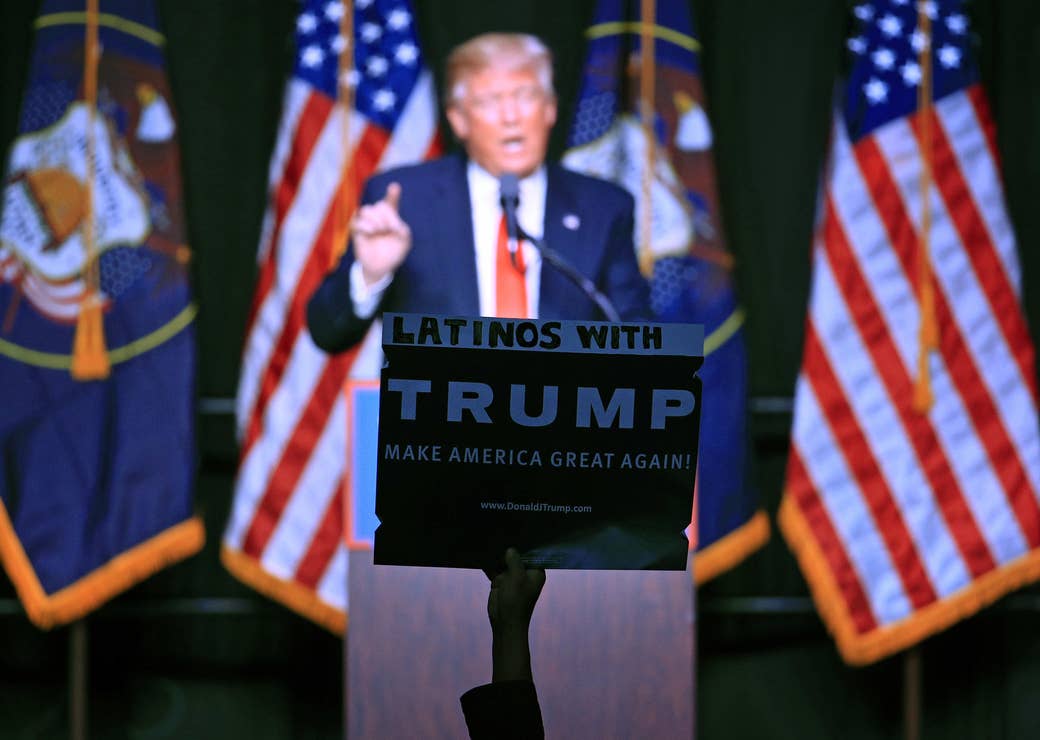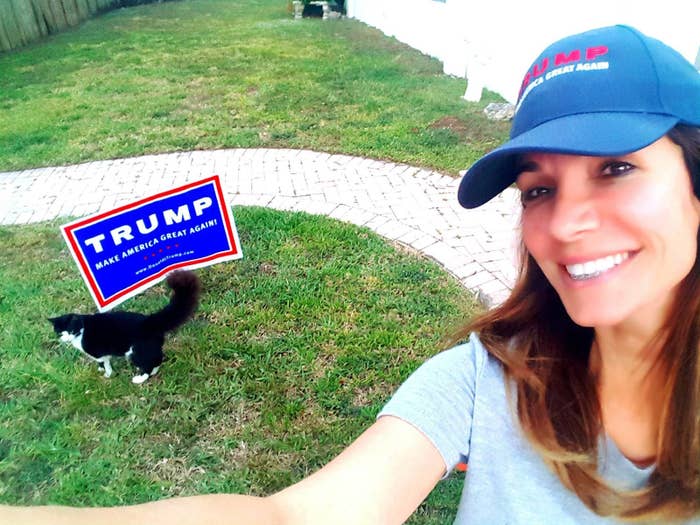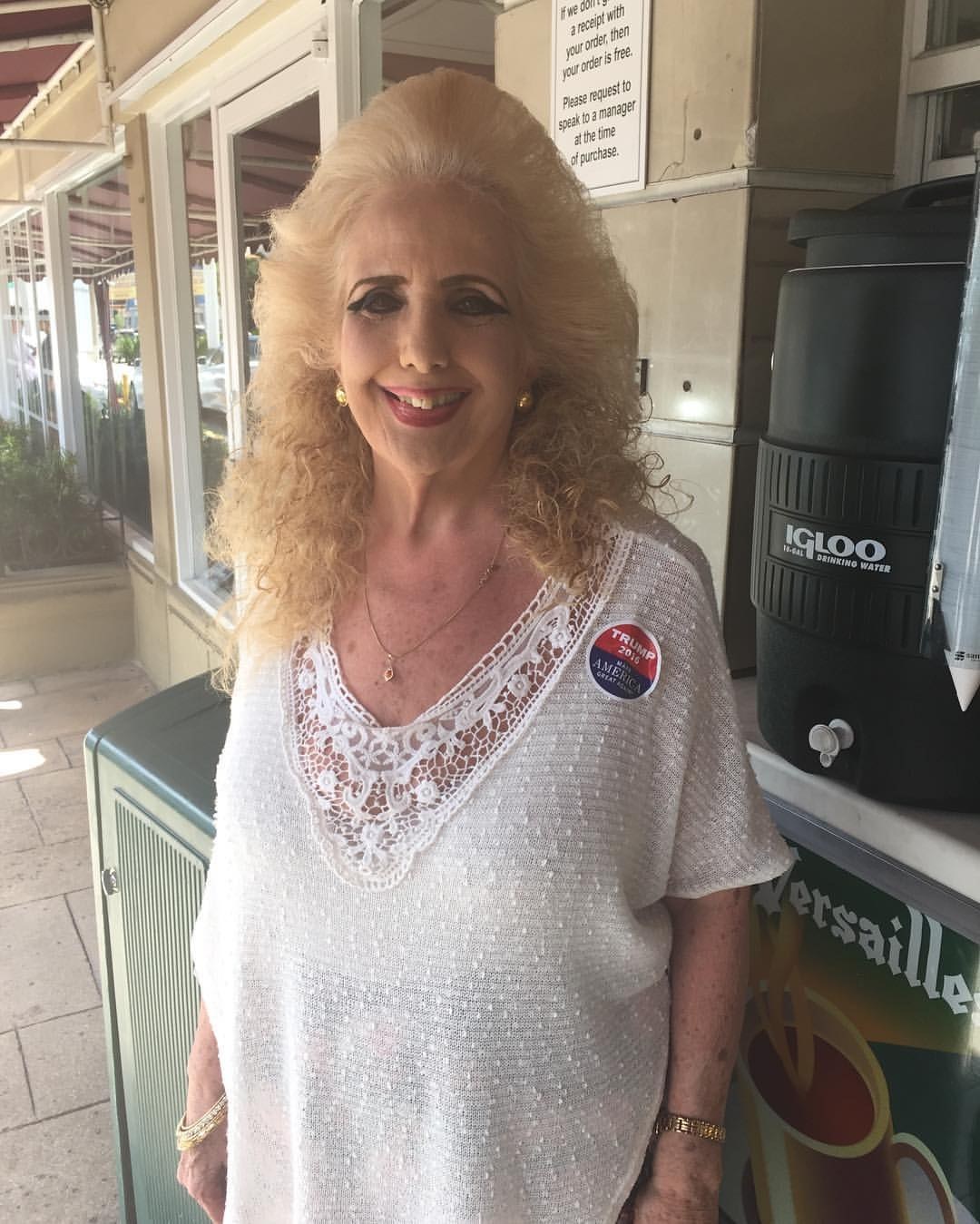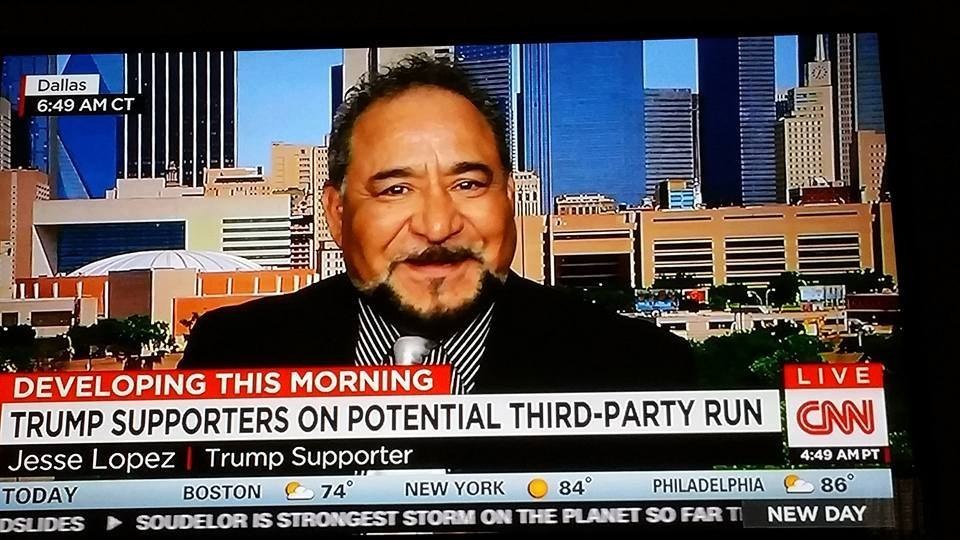
MIAMI — Let's get this out of the way. Donald Trump is toxic with most Latino voters. A new USC/LA Times poll found that in California he has 9% favorable and 87% unfavorable ratings, the worst in a long series of historically terrible polls.
Still — even a low percentage of Latino voters would mean a couple million Hispanic supporters. And an observer of this divisive election cycle might ask: who are these people?
One answer, found in public polling, in interviews at polling places in Nevada and Florida, and in conversations with self-identified Trump supporters on Facebook, appears to be that they're the types of people otherwise disposed to like Donald Trump. Older men; former members of the military; people enraged by the power of the establishment; American nationalists. Another answer reflects the diversity within the term “Latino”: Some of Trump’s supporters’ families have been American citizens for centuries, don’t know any undocumented immigrants, or don’t identify with newcomers from Mexico and elsewhere — all reasons that contribute to why they embrace his immigration stances.
One thing they all have in common, though, is a thick skin.
"I’ve gotten a lot of crap from friends and family about supporting him," said Ted Yanez, 26, from Eugene, Oregon, whose family has Mexican ancestry. "There's quite a stigma around Trump and his ideas of securing the border."
"As a Hispanic who supports or leans towards Trump you get caught in a race war."
"I'm not winning any popularity contests," said Jesse Lopez from Corpus Christi, Texas, of his constant battles on Facebook with Latinos branding him a traitor. Another supporter, 54, and an internet sales manager for a car dealership in Los Angeles named John Avila, lamented that "as a Hispanic who supports or leans towards Trump you get caught in a race war."
And for Ileana Garcia, a Cuban-American former radio and TV personality from Miami who said she became “enamored” with Trump after the first debate, there have also been suggestions that future professional opportunities will be limited by her public cheerleading for Trump on Facebook.
“Friends at Univision have said ‘if you ever want to do voiceover work again don’t say that, don’t put that up there,’” she said.

Many of their votes have been counted in the early primaries. Trump already has secured Hispanic Republican votes in states like Nevada — where he was the first to trumpet (sorry) that he had support from 44% of Latinos in Nevada, according to not always reliable caucus entrance polls. In Florida, where he blew away Cuban-American Marco Rubio making his last stand in his home state, Trump garnered 26% of the sizable Latino vote, but 40% of the non-Cuban Hispanic vote.
One thing many Trump supporters have in common is an aversion to a new generation of identity politics, and to the growing pan-Latino identity that has drawn people from diverse backgrounds into an increasingly coherent force in American politics.
In interviews, his supporters stressed their American roots. No one was just Puerto Rican or Mexican, and few used a hyphenated identity common in the Hispanic community. One said his family "has been in the country a couple hundred years" and another when asked his ethnicity said his family was "from Texas, which used to be Mexico."
"I don’t speak Spanish, and the Mexican culture doesn't resonate with me," said Avila.
Lopez, who voted for Trump in the Texas primary, identifies as American with Latino ancestry and is a 20-year Navy veteran. He said he was once a "radical Latino" who marched with Cesar Chavez for migrant worker rights in Los Angeles and Arizona but later in life worked for military police in places like Camp Pendleton in San Diego, along with customs and border patrol where he saw "many illegals" cross the border.
“Holy crap, that’s exactly that’s how I feel,” Lopez remembers thinking when Trump announced his candidacy.
Yanez from Oregon, who has a white mother and a Latino father, said that while he puts “Hispanic” on official forms, his father puts that he is white because they are “pale.” He said something which would be anathema to many Latino immigrants: that Trump’s plan to deport undocumented immigrants might improve the image of Hispanics across the country, because while more are going to college, negative stereotypes that stigmatize the entire community still persist.
“When he says he loves the Mexican people, I don’t think he actually hates any single race or group,” Yanez said, finishing the thought. “I think he legitimately wants to help make things better for everybody.”
Unprompted, almost all of Trump’s Hispanic supporters were quick to bring up a charge that is widely accepted among his many detractors: That he’s a racist.
"I don’t think he’s a racist, I just think he’s not a politician."
"I don’t think he’s a racist, I just think he’s not a politician," said Victor Velazquez, who like many others BuzzFeed News spoke with was part of one of the various Hispanics for Trump Facebook pages.
Velazquez, 62, from Paterson, New Jersey said he is a Puerto Rican American, and that people like Trump because he is an outsider.
He likened Washington to a relay race where "a whole bunch of insiders, who control the whole nation and control the wealth" endlessly pass the baton from one to the other.
“He has immense sincerity and conviction, he is like un viejo malcriado, like an uncle who misbehaves,” said Garcia from Miami. “He says really stupid things sometimes but he meant them at that moment. He is the most sincere one. He doesn’t know how to explain it, he doesn’t know how to be politically correct.”
And while one of the persistent criticisms of Trump has been that his rhetoric leans in an authoritarian strongman direction, many of his Hispanic supporters said they liked him because he is literally a strong man who says what he means.
Dave Maestas, 43, is a retired special forces green beret who spent 20 years in the military. To him Trump exudes leadership.
"In my experience, a lot of Latinos that I know in the military community, 90% are for Trump," he said.
"Mexican-Americans respond to somebody that is willing to say things and not be afraid to say them," said Robert Ruiz Rios Parra, 61, from Phoenix.
"We have to make sure we have strong military and safe borders," said Christopher Gomez, 41, from Irving, Texas. "We have to worry about the Muslims too — well not Muslims — the terrorist people. He’s a strong guy, he's concerned with security."
"I don’t see how the country as a whole is going to stomach mass deportation and a wall being built."
Trump has gotten to where he is because from that first summer day last June he hammered on the issue of illegal immigration, offending Mexicans and immigrants along the way when he characterized those coming across the border as criminals and rapists. Many of his Hispanic supporters say they weren't offended because they don't believe he was referring to them.
"He didn't insult all Mexicans by his comments," said Antonio Rios, 20, a former Bernie Sanders supporter who flipped to Trump and voted for him in the Kentucky primary.
"I'm open-minded enough to understand what he meant," Rios wrote in an interview he insisted be conducted over Facebook Messenger. "I'm not going to let liberal biased media outlets decide how I should feel."
"I’m a third generation Mexican-American so I didn’t take it personally," Parra from Phoenix said, alleging murders related to Mexican drug cartels that no one hears about. "A lot of people that aren’t from around here, they don’t understand what Arizonans are going through, with the bulk of the drugs coming through here."
Guess who just early voted in Florida? @realDonaldTrump #MakeAmericaGreatAgain #TrumpTrain #Florida #SuperTuesday
"I’m Hispanic, he wants to build a wall to stop illegal immigration, that’s something I’m totally for," said Alexi Juan Lopez, a 23-year-old Cuban American student at Florida International University. "America is only great if we live by the law."
Lopez is a true believer — he early voted for Trump and can often be found trying to get people to join a Millennials for Trump Facebook page that he posts on college Republican pages. But the Trump bandwagon among youth isn't exactly bursting at the seams.
"Out of my friends, I’m the only one supporting Trump," he said.
The physical symbol of the division Trump has sewn — and of what many American Latinos see as his hostility — is the wall he says he’d build on the Mexican border. Some of his supporters have no problem with that either.

"I believe in the wall, he's going to build the wall," said Clara Roteta, a respiratory therapist, interviewed the day of the Florida primary at the famed Versailles Cuban restaurant in Miami’s Little Havana. "Not to keep people away, but to keep illegals away from the U.S."
But many Hispanic Trump supporters aren't so sure that he really plans to build a wall along the border or deport millions of undocumented immigrants.
"I don’t think he would," Avila from Los Angeles said, drawing a parallel between the wall and Obama's effort to push an immigration overhaul through Congress.
"That’s why we have the Senate and House of Representatives in place. They’ve offset some of the stuff Obama wants to do, it would be the same kind of thing, but it moves us in the right direction. I don’t see how the country as a whole is going to stomach mass deportation and a wall being built,” he said.
Maestas — who said that as "a military man security is one of the greatest concerns I have for the country" — conceded his belief that "no one is going to make 12 million illegal immigrants leave our country."
“I really don’t think he’s going to build a wall.”
“I really don’t think he’s going to build a wall,” said Jose Martinez a 60-year-old Mexican-American dentist from San Diego who said he fears drug cartel violence could make its way up to where he lives and put his two college-aged children at risk. “I don’t think he’s going to deport everyone.”
One thing Hispanic Trump supporters have to grapple with that may not affect others, is what it would look like to actually deport millions of undocumented immigrants currently in the country, many with ties to American citizen Latinos.
Most BuzzFeed News spoke with said they do not know someone in the country illegally.
"Honestly, I think a lot of people are offended because they probably either know someone, a friend or family member, who is here illegally," Yanez from Oregon said, not unkindly. "I personally don’t know anybody, I never met somebody who is not here legally. I can understand how it might be harmful to them personally," he added, noting that it's not just Mexicans who would be affected and with Ronald Reagan's 1986 amnesty, "a lot of them came from Ireland."
The only Trump supporter who said they knew people in the country illegally was Parra who both said the law is the law but also seemed to struggle with the idea of mass deportation of people he knows.
"I don’t want the people deported but right now we are at that point that we need someone who is going to make hard decisions," he said.
"I don’t take offense to it, but I do think about the people who are here illegally," — he continued, before seeming to grapple with the thought — "but I don’t know what’s right and what’s wrong."
The polling firm Latino Decisions found in 2014 that 58% of Latinos know someone who is undocumented, and a 2013 national survey found that one-third of Latino registered voters have an undocumented family member, further illuminating the extent to which immigration is a personal issue, and why Hispanic Trump supporters are so few and far between.

Many expect Trump to moderate his tone or policies in a general election matchup with Hillary Clinton. And while Trump’s backtracks and misstatements haven’t seemed to hurt him, it could present problems for him if one of these areas is immigration, as many of his Latino supporters believe it is. “He may be like a lot of politicians saying a bit of what we want to hear,” Gomez from Texas, conceded.
And Trump, whose favorability with women has plummeted, could struggle with Latinas who have voted for Clinton at higher rates than Hispanic men in places with large Latino electorates like Texas and Florida, according to exit polls.
But while they wait to see who a general election Trump might be, Trump’s Latino supporters are trying to combat a new set of stereotypes.
Lopez, the Navy veteran, volunteered some facts about himself before getting off the phone.
"By the way, I have a Bachelor’s degree, I make $75,000 a year,” he said. “I don’t live in a trailer, I'm not a hillbilly.”
